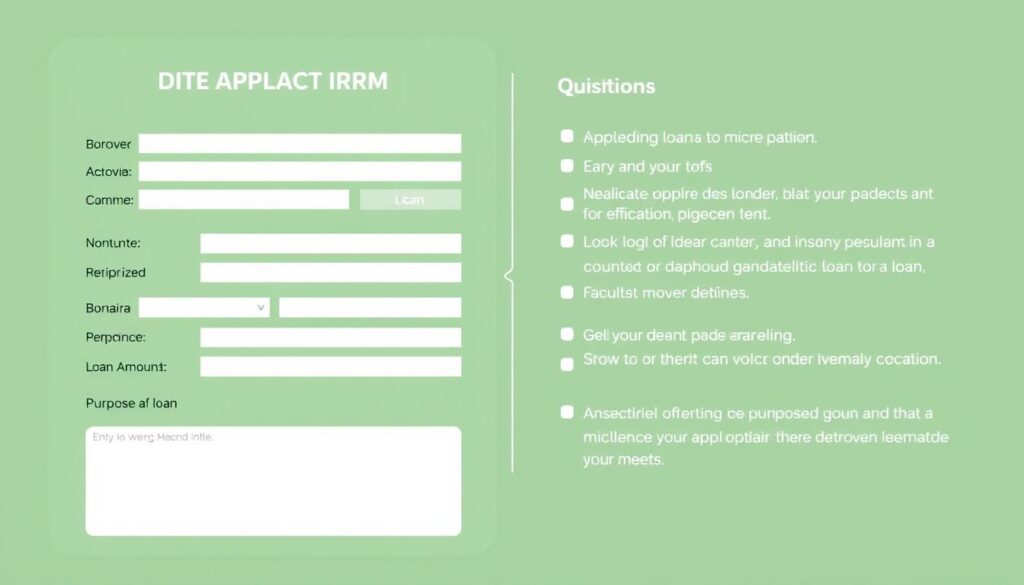Securing a business loan can be a crucial step in growing and sustaining a company. In today’s market, various financing options are available, but the accessibility of these loans can vary greatly.
The process of obtaining a loan involves several key factors, including credit scores, time in business, revenue thresholds, and industry considerations. Lenders evaluate these factors when reviewing business loan applications, making some loans more accessible than others.
Understanding the requirements and processes involved in securing a business loan is essential for entrepreneurs seeking financing. By examining the current approval rates across different types of lenders and analyzing the factors that affect loan approval, businesses can better position themselves for success.
Key Takeaways
- Understanding the key factors that lenders evaluate when reviewing business loan applications.
- Knowing the current approval rates across different types of lenders.
- Identifying the most accessible funding sources for your specific business situation.
- Recognizing the importance of credit scores in the loan approval process.
- Familiarizing yourself with the documentation requirements and application process.
Understanding Business Loan Accessibility
Understanding the intricacies of business loan accessibility is essential for businesses seeking to secure funding in today’s competitive market. The landscape of business lending is complex, with various factors influencing the ease with which businesses can obtain loans.
Current Approval Rates and Market Conditions
The current state of business loan approval rates varies significantly across different types of lenders. According to the Q4 2023 Small Business Lending Survey, large banks approved 49% of business loan applications, whereas small banks had a much higher approval rate of 89%. Furthermore, 24% of lenders reported tightening their credit standards, making it more challenging for businesses to secure loans. This disparity highlights the importance of understanding the lending landscape.
- The current business lending landscape shows significant variation in approval rates depending on the type of lender.
- Recent market conditions have led to tightened credit standards across many lenders.
Factors That Determine How Easy It Is to Get Approved
Several key factors determine the ease of getting approved for a business loan. These include:
- The business’s credit profile, with a good credit score being crucial.
- Revenue history, as lenders assess the financial stability of the business.
- Time in operation, with established businesses generally having an easier time securing loans.
- Industry type, as certain industries are considered higher risk by lenders.
By understanding these factors and the current market conditions, businesses can better navigate the process of securing a business loan.
Key Factors That Affect Business Loan Approval
Securing a business loan can be a complex process, heavily influenced by several key factors that lenders consider crucial for approval. Understanding these elements is vital for businesses seeking financing.
Credit Score Requirements
The minimum credit score required for a business loan varies significantly across different types of lenders. Traditional banks and credit unions typically demand a credit score of 700 or higher, while some online and alternative lenders may consider businesses with credit scores in the mid-500s if other financial indicators are strong.
Credit score is a critical factor as it reflects the creditworthiness of a business. Lenders use this score to assess the risk of lending.
Time in Business
The time in business is another crucial factor that lenders evaluate. Most traditional banks prefer businesses that have been operational for at least two years, demonstrating stability and a proven track record. However, some online lenders may be more flexible, considering businesses that have been operational for as little as six months.
Annual Revenue and Cash Flow
Annual revenue and cash flow are vital indicators of a business’s financial health. Lenders assess these to ensure that a business can repay the loan. Different lenders have different thresholds for annual revenue, ranging from $36,000 to over $100,000, depending on the loan type and lender.
| Lender Type | Minimum Annual Revenue |
|---|---|
| Traditional Banks | $100,000+ |
| Online Lenders | $36,000+ |
| Alternative Lenders | Varies |
Industry Type and Risk Assessment
The industry type and associated risk are also significant factors. Businesses in stable industries like healthcare and professional services are generally viewed more favorably than those in volatile or emerging sectors.
“Lenders assess industry risk to determine the likelihood of a business’s success and its ability to repay the loan.”
How Easy Is It to Get a Business Loan Based on Loan Type
The ease of obtaining a business loan varies significantly depending on the type of loan you’re applying for. Different loan types cater to different business needs and have varying approval processes.
Traditional Bank Loans
Traditional bank loans are often considered the most challenging to secure due to their stringent requirements, including excellent credit scores (700+), multiple years in business, and substantial annual revenue. However, they offer the most favorable interest rates and terms.
SBA Loans
SBA loans, backed by the Small Business Administration, offer a slightly more accessible option than conventional bank loans. Programs like the SBA 7(a) and 504 loans provide competitive rates for qualified businesses, making them an attractive choice for many entrepreneurs.

Online Lender Options
Online lenders have revolutionized business financing by offering streamlined application processes and more flexible qualification criteria. Although they come with higher interest rates, ranging from 14% to 99% APR, their approval rates are higher, and funding is faster.

Microloans and Alternative Financing
Microloans, particularly those administered through the SBA microloan program, provide funding up to $50,000 with more accessible requirements. Alternative financing options like invoice factoring, merchant cash advances, and equipment financing offer specialized solutions with unique qualification criteria.

In conclusion, the ease of getting a business loan is heavily influenced by the type of loan. Understanding the requirements and benefits of each loan type can help businesses make informed decisions and increase their chances of approval.
Documentation and Requirements for Business Loan Applications
Lenders require a comprehensive set of documents to assess the viability of your business loan application. The specific requirements may vary depending on the lender and the type of loan you’re applying for.
Essential Business Documentation
The documentation required for business loan applications typically includes comprehensive business information. This encompasses your company’s legal name, address, employer identification number, and business structure details. Financial documentation is also crucial, with most lenders requiring at least two years of business tax returns, profit and loss statements, balance sheets, and recent bank statements to verify your revenue claims and cash flow patterns.
- A detailed business plan is often essential, particularly for startups or expansion loans, as it demonstrates your understanding of the market and outlines your growth strategy.
- Legal documentation such as business licenses, articles of incorporation, and contracts with major clients or suppliers may be requested to verify your business’s legal standing and operational stability.
- Debt schedules outlining all existing business obligations help lenders assess your current debt load and determine if your cash flow can support additional financing.
Personal Financial Information Requirements
When applying for a business loan, lenders may also require personal financial information from business owners, especially those with a significant stake in the company. This can include personal tax returns, personal financial statements, and sometimes even personal bank statements from all owners with a 20% or greater stake in the business.
Lenders may also request information about your credit history, as a good credit score can significantly improve your chances of approval. Some lenders may require you to put up collateral, such as real estate or equipment, to secure your loan. Most lenders will require you to sign a personal guarantee when you apply for a small-business loan, making you personally liable for the debt if your business defaults.
Step-by-Step Business Loan Application Process
To get a business loan, it’s essential to comprehend the step-by-step process involved, from determining funding needs to closing the loan. The business loan application process is multifaceted, involving several critical steps that require careful planning and execution.
Determining Your Funding Needs
The first step in the business loan application process is to determine your funding needs. This involves assessing the exact amount required, the specific purpose of the funds, and how the financing will contribute to your business growth or operations. A clear understanding of your financial requirements helps in selecting the most appropriate loan type.
Researching and Comparing Lenders
Researching and comparing lenders is a critical step that involves evaluating different financial institutions based on their loan products, interest rates, terms, fees, and qualification requirements. This helps identify the best match for your business profile. As noted by a financial expert, “The right lender can make a significant difference in the success of your business loan application.”
Preparing Your Application Materials
Preparing your application materials requires gathering all necessary documentation, organizing financial records, creating or updating your business plan, and ensuring all information is accurate, consistent, and presents your business in the most favorable light.
Submitting Your Application
When submitting your application, attention to detail is essential. Follow the lender’s instructions precisely, provide all requested information, and be prepared to respond promptly to any follow-up questions or requests for additional documentation.
Reviewing Loan Offers and Closing
If approved, carefully review all loan offers by examining not just the interest rate but also the APR, fee structure, prepayment penalties, and repayment terms before making your final decision. The closing process involves signing the loan agreement, setting up payment arrangements, and potentially securing the loan with business or personal assets depending on the loan type.
By following these steps and understanding the intricacies of the business loan application process, you can improve your chances of securing the funding your business needs.
How to Improve Your Chances of Business Loan Approval
To boost your chances of securing a business loan, several key strategies can be employed. Lenders assess various factors before approving a loan, and understanding these can significantly improve your application’s success rate.
Building Business Credit
Establishing a strong business credit profile is fundamental. This involves creating credit accounts with suppliers who report to business credit bureaus, maintaining a separate legal business entity, and ensuring timely payments on all business obligations. By doing so, you demonstrate your business’s creditworthiness, making it more attractive to lenders. Your business credit score becomes a crucial factor in this assessment.
Strengthening Your Business Finances
Robust financial management is key to lender confidence. Implementing effective bookkeeping practices, increasing profit margins, and reducing unnecessary expenses are vital. Demonstrating consistent revenue growth over time also positively impacts your loan application. Cash flow management is particularly important, as lenders prioritize businesses with healthy cash reserves and the ability to cover operating expenses and debt service.
Creating a Compelling Business Plan
A detailed business plan articulates your business model, market opportunity, competitive advantages, and plans for loan utilization and repayment. This document can overcome other weaknesses in your application by showcasing your business’s potential and your commitment to its success.
Offering Collateral or Personal Guarantees
Providing strong collateral can significantly reduce lender risk, compensating for shortcomings in other areas. Real estate, equipment, inventory, and accounts receivable can serve as valuable security. Alternatively, personal guarantees demonstrate your commitment but increase personal financial risk.
| Strategy | Benefits |
|---|---|
| Building Business Credit | Improves creditworthiness, increases lender confidence |
| Strengthening Business Finances | Demonstrates financial stability, enhances loan eligibility |
| Creating a Compelling Business Plan | Showcases business potential, articulates loan utilization |
| Offering Collateral or Personal Guarantees | Reduces lender risk, may improve loan terms |
“A good business plan tells the story of your business, including where you’ve been, where you are now, and where you’re going. It outlines your goals and the steps you’ll take to achieve them, serving as a roadmap for your business’s future.”
By focusing on these areas, you can significantly improve your chances of business loan approval. Each step contributes to presenting a robust and attractive loan application, enhancing your credibility with lenders.
Business Loan Alternatives If You’re Denied
Exploring alternative financing options is a crucial step if you’re unable to secure a traditional business loan. If your business loan application is denied, there are several other ways to secure the capital you need to grow or sustain your business.
Business Credit Cards
Business credit cards offer a flexible financing alternative with typically easier qualification requirements than traditional loans. They provide revolving credit lines that can help manage short-term expenses while potentially offering rewards programs tailored to business spending.

Crowdfunding and Peer-to-Peer Lending
For businesses with strong consumer appeal, crowdfunding platforms provide an opportunity to raise capital without taking on debt. Peer-to-peer lending marketplaces connect businesses directly with individual investors who may have more flexible lending criteria than traditional institutions.
Business Grants
Business grants from government agencies, private foundations, and corporations represent an ideal funding source as they don’t require repayment. Though competition is fierce and application processes can be lengthy and complex.
Invoice Factoring and Merchant Cash Advances
Invoice factoring allows businesses to convert outstanding invoices into immediate cash by selling them to a factoring company. Merchant cash advances provide upfront capital in exchange for a percentage of future credit card sales, offering accessibility to businesses with strong daily credit card transactions.

Conclusion: Navigating the Business Loan Landscape
Navigating the complex world of business loans requires a deep understanding of lender requirements and market conditions. To get business financing, it’s essential to understand that securing a business loan involves a complex interplay between your business qualifications and the varying requirements of different lenders. Your credit profile plays a crucial role in determining loan accessibility.
By building your business financial strength, maintaining comprehensive documentation, and exploring available loan options, you can maximize your chances of securing the capital needed. For small business owners, understanding the diverse loan landscape and improving creditworthiness are key to successful financing.






